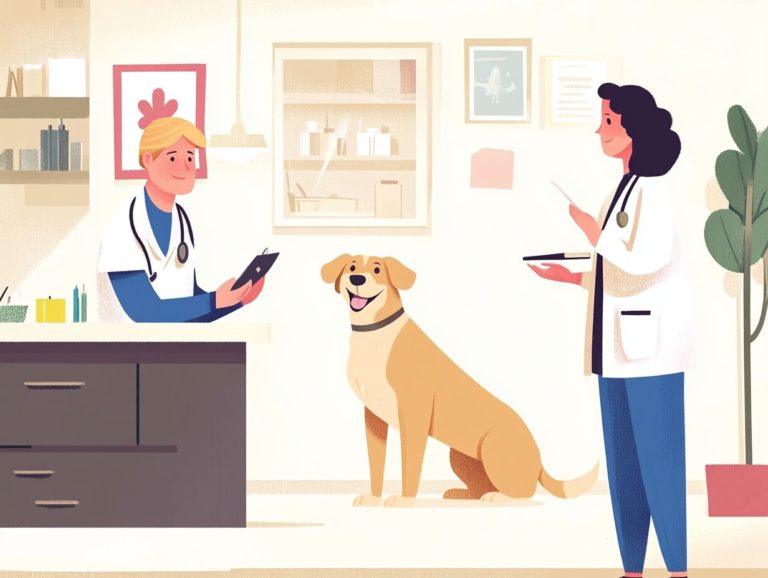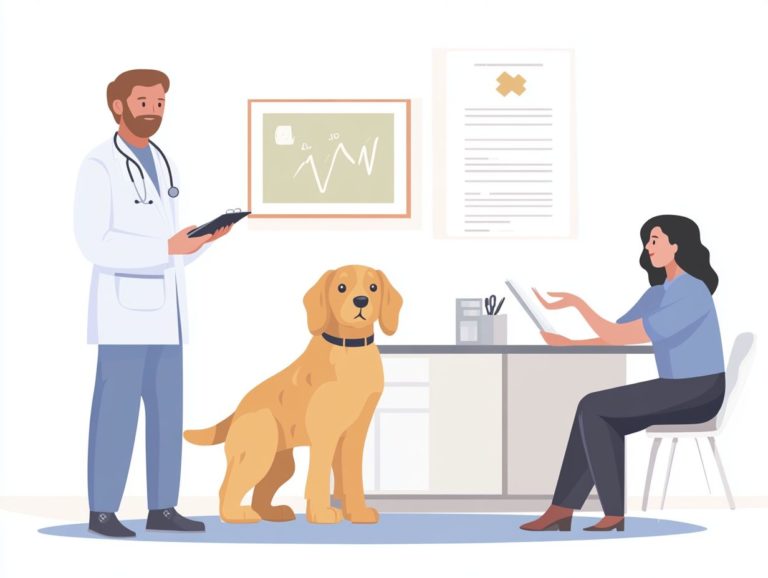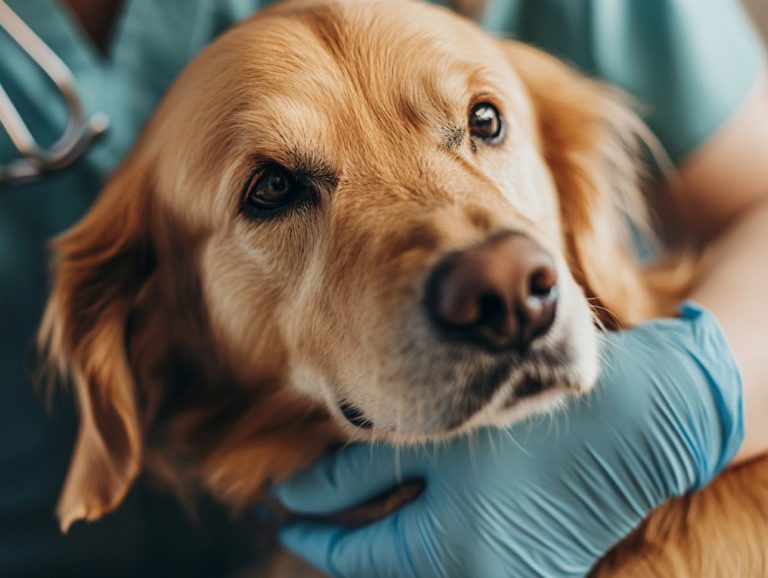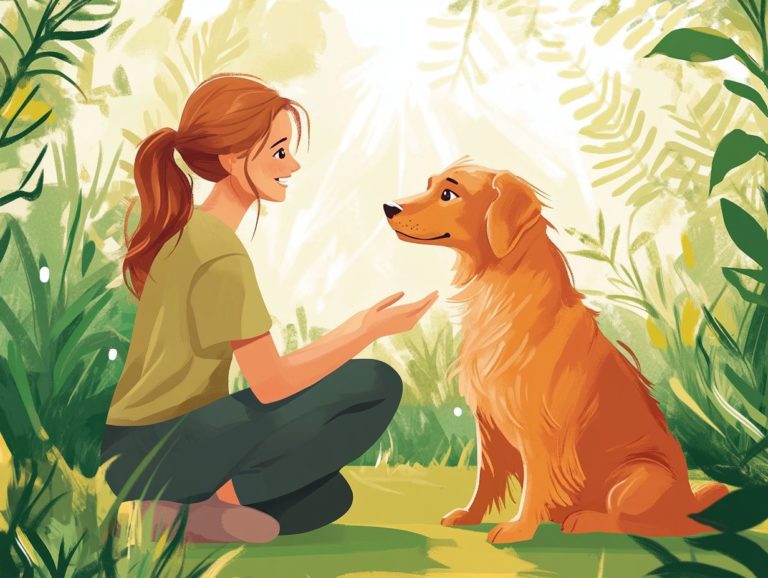How to Choose a Specialized Pet Anxiety Approach
Pet anxiety can be quite a challenge, not just for your furry friend but for you as well. Understanding the causes and symptoms is vital in tackling this widespread concern.
Whether you re leaning towards traditional methods like medication and behavioral therapy or considering alternative natural remedies, choosing the right approach for your pet is essential.
This guide will assist you in navigating the options available, emphasizing the significance of professional support, and offering practical tips for effective implementation.
Unlock the secrets to creating a calmer, happier environment for your cherished pet!
Contents
- Key Takeaways:
- Understanding Pet Anxiety
- Traditional Approaches to Pet Anxiety
- Alternative Approaches to Pet Anxiety
- Choosing the Right Approach for Your Pet
- Working with a Professional
- Implementing the Chosen Approach
- Frequently Asked Questions
- What is a specialized pet anxiety approach?
- Why is it important to choose a specialized pet anxiety approach?
- What specialized treatments can help my pet’s anxiety?
- How can I tell if my pet needs a specialized anxiety approach?
- Can I use a specialized pet anxiety approach in combination with other treatments?
- How do I find a reputable specialist for my pet’s anxiety?
Key Takeaways:
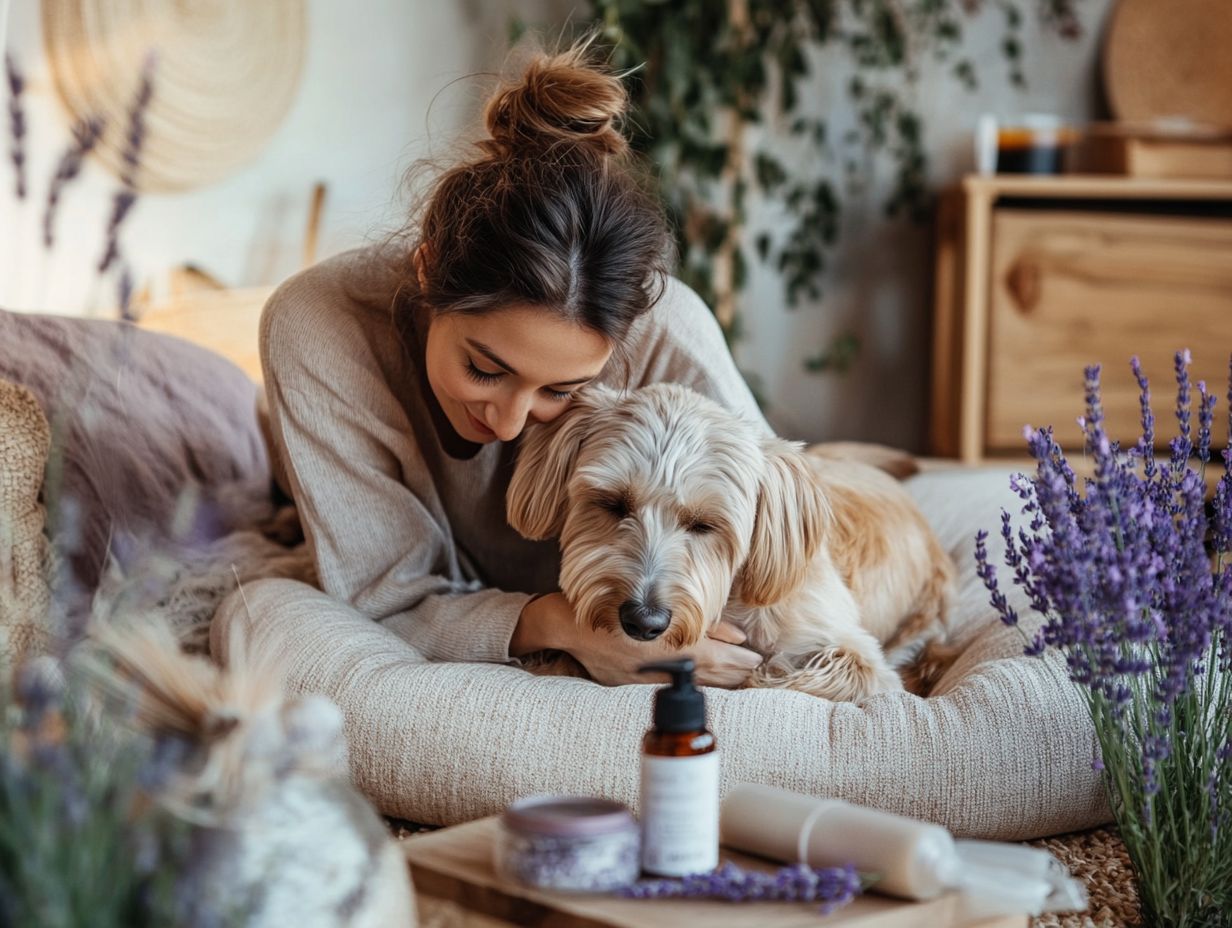
- Consider all factors, such as your pet’s personality and triggers, when selecting a specialized approach for their anxiety.
- Seek guidance from a qualified expert to help determine the best approach for your pet’s specific needs.
- Successful management of pet anxiety may require a combination of traditional and alternative approaches, along with consistent implementation and monitoring.
Understanding Pet Anxiety
Let s dive into pet anxiety in dogs, which is essential for enhancing their physical well-being and mental health. This condition can take several forms, including separation anxiety, fear-related anxiety, and age-related anxiety, each presenting unique clinical signs that you should identify.
Dogs grappling with anxiety might exhibit destructive behavior, excessive barking, or withdrawal. These behaviors can be distressing not only for them but also for you as their owner. Recognizing common triggers of anxiety, such as environmental changes or previous traumatic experiences, is vital for addressing this issue and providing the support your dog needs.
Causes and Symptoms
Various factors contribute to dog anxiety, each presenting specific symptoms for you to be aware of. Common triggers include environmental stressors, changes in routine, and past negative experiences, all of which can lead to behavioral issues like destructive behavior or excessive barking.
Among these triggers, separation anxiety stands out. This condition typically manifests when your dog becomes overly attached to you. Signs such as whining, pacing, or even attempts to escape often show up when your dog is left alone.
Fear-related anxiety may develop in response to loud noises like thunderstorms or fireworks. In these situations, your dog might tremble, hide, or lose their appetite.
Acting quickly to detect these anxiety symptoms can make a huge difference! Your timely intervention can often mitigate long-term distress and help restore your dog s sense of security in their environment.
Traditional Approaches to Pet Anxiety
When it comes to tackling pet anxiety, traditional methods typically combine medication with behavioral therapy for effective management. Medications like SSRIs (selective serotonin reuptake inhibitors), fluoxetine, clomipramine, and benzodiazepines may be prescribed by healthcare professionals to ease symptoms.
Behavioral therapy also uses training techniques designed to reshape your dog’s behavior, helping them find their calm amidst the chaos.
Medication and Behavioral Therapy
The use of medication and behavioral therapy serves as a cornerstone in managing anxiety disorders in dogs. This comprehensive approach addresses both emotional well-being and behavioral modifications. SSRIs like fluoxetine and clomipramine, along with benzodiazepines, can help alleviate immediate anxiety symptoms, while behavioral therapy focuses on long-term training strategies.
This dual approach enables you to ease acute distress while fostering healthier coping mechanisms over time. For example, desensitization exercises can gradually expose your dog to anxiety-inducing stimuli in a controlled setting, helping them adapt more effectively. Positive reinforcement techniques such as rewarding calm behavior or practicing commands like “sit” and “stay” can reinforce desirable actions, creating a more balanced emotional state.
Incorporating these strategies not only enhances your dog s response to anxiety but also strengthens the bond you share, leading to more profound and sustainable improvements in their overall quality of life.
Start implementing these tips today for a happier pet!
Alternative Approaches to Pet Anxiety

Alternative approaches to pet anxiety present a range of solutions that beautifully complement traditional methods, emphasizing natural remedies and therapies. For more insights, check out the importance of a comprehensive approach designed to enhance emotional support and well-being in dogs.
Exciting options like CBD oil and other herbal treatments have surged in popularity, offering viable alternatives to medications and ensuring your canine companions receive the emotional support they need for effective anxiety management. This highlights the importance of pet healthcare professionals.
Natural Remedies and Therapies
Natural remedies and therapies are increasingly becoming the go-to choice for dog owners looking to manage anxiety without resorting to medications.
Options like CBD oil, essential oils, and holistic therapies treatments that consider the whole pet, not just their symptoms can offer soothing effects and emotional support, making them appealing alternatives for addressing pet anxiety.
Many pet owners are embracing these gentle approaches, frequently sharing success stories that illustrate the remarkable impact such treatments can have on their dogs well-being.
Take Bella, for example a dog who once trembled in fear during thunderstorms. After her owner introduced a blend of lavender and chamomile essential oils, Bella flourished.
Holistic therapies, such as acupuncture and calming massages, have also shown great potential in alleviating stress for anxious pets. As you explore these remedies, consult with veterinarians or certified animal practitioners.
This ensures that the method you choose is safe and suitable for your furry companion, as some remedies might have side effects or may not be appropriate for certain health conditions.
Choosing the Right Approach for Your Pet
Selecting the optimal strategy for managing your dog’s anxiety requires thoughtful consideration of several factors that can significantly impact the effectiveness of your chosen treatment options. For guidance, refer to how to seek help for your anxious pet.
Understand your dog’s specific anxiety symptoms to tailor the right approach. Recognizing the potential advantages of emotional support and obedience training will help you confidently navigate the path to identifying the most appropriate method for your furry companion.
Factors to Consider
When choosing the best treatment for your dog’s anxiety, it’s essential to weigh several critical factors that can significantly impact the outcome, including the role of veterinary advice in managing pet anxiety.
Consider the severity of the anxiety symptoms, your dog’s age, and their past experiences. These elements may require you to tailor training and emotional support specifically for them.
Anxiety can present itself in a spectrum of intensities, from mild nervousness during thunderstorms to debilitating fear that disrupts daily life. Accurately assessing the nature of these symptoms is vital; more severe cases may demand a combination of behavioral therapies and medical intervention.
Younger dogs might respond more favorably to socialization techniques, while older dogs with deeply ingrained behaviors often require patience and gradual exposure to stressors. Understanding your dog’s history, including any prior trauma or lack of socialization, enables you to approach the situation with compassion.
By considering these factors, you can develop an effective management plan that not only addresses their anxiety but also enhances the overall well-being of your cherished companion.
Working with a Professional
Engaging a qualified expert can be instrumental in effectively managing your dog’s anxiety disorder. It’s crucial to act quickly if your dog shows signs of anxiety.
Healthcare professionals, such as veterinarians and certified dog trainers, offer invaluable insights into anxiety disorders and can recommend tailored treatment plans that resonate with your dog s unique situation.
Start exploring these options today to help your pet feel better!
The Importance of a Qualified Expert

The significance of consulting a qualified expert for your dog s anxiety cannot be overstated. Their expertise is invaluable in navigating the complexities of anxiety disorders. These professionals can provide tailored training strategies, ensuring you effectively meet your dog’s specific needs.
Veterinarians, certified dog trainers, and animal behaviorists each bring essential skills to the process. For example, a veterinarian might suggest a combination of medication and behavioral therapy to greatly alleviate symptoms. Meanwhile, a certified trainer could employ positive reinforcement techniques to help build your dog’s confidence.
Animal behaviorists, with their deep understanding of canine psychology, can create detailed plans that include environmental adjustments and socialization strategies. Successful interventions might involve a structured desensitization program, which helps your dog gradually get used to anxiety-inducing triggers, or utilizing calming aids like anxiety wraps or pheromone diffusers everything based on tailored assessments by these knowledgeable professionals.
Implementing the Chosen Approach
Implementing your chosen approach to manage your dog’s anxiety demands a well-structured plan and unwavering commitment. Understanding when to consult a professional for pet anxiety is crucial for meeting your dog’s emotional needs in the long run.
By adopting practical tips and ensuring consistent application of training strategies, you can cultivate positive results as time progresses. Start today to see positive changes in your dog’s behavior!
Tips for Success and Long-Term Management
To truly help your dog, it’s exciting to incorporate powerful long-term strategies! Start by maintaining a consistent routine, using positive reinforcement in your training methods, and being mindful of your dog’s anxiety symptoms.
Establishing a daily schedule for walks, meals, and playtime creates a sense of security and predictability for your dog, which is essential for reducing anxiety levels. By carefully observing behavioral changes, you can identify triggers and adjust your approach accordingly.
For example, one pet owner discovered that monitoring her dog’s reactions during storms allowed her to create a calm space equipped with soothing music and a favorite toy, leading to remarkable improvements.
These success stories serve as a powerful reminder that patience and consistency can significantly enhance your dog’s emotional well-being.
Frequently Asked Questions
What is a specialized pet anxiety approach?
A specialized pet anxiety approach is a method or technique designed specifically to address and treat anxiety in pets. It considers the unique needs and behaviors of animals and aims to alleviate their anxiety in a safe and effective manner, as outlined in understanding different types of pet anxiety experts.
Why is it important to choose a specialized pet anxiety approach?
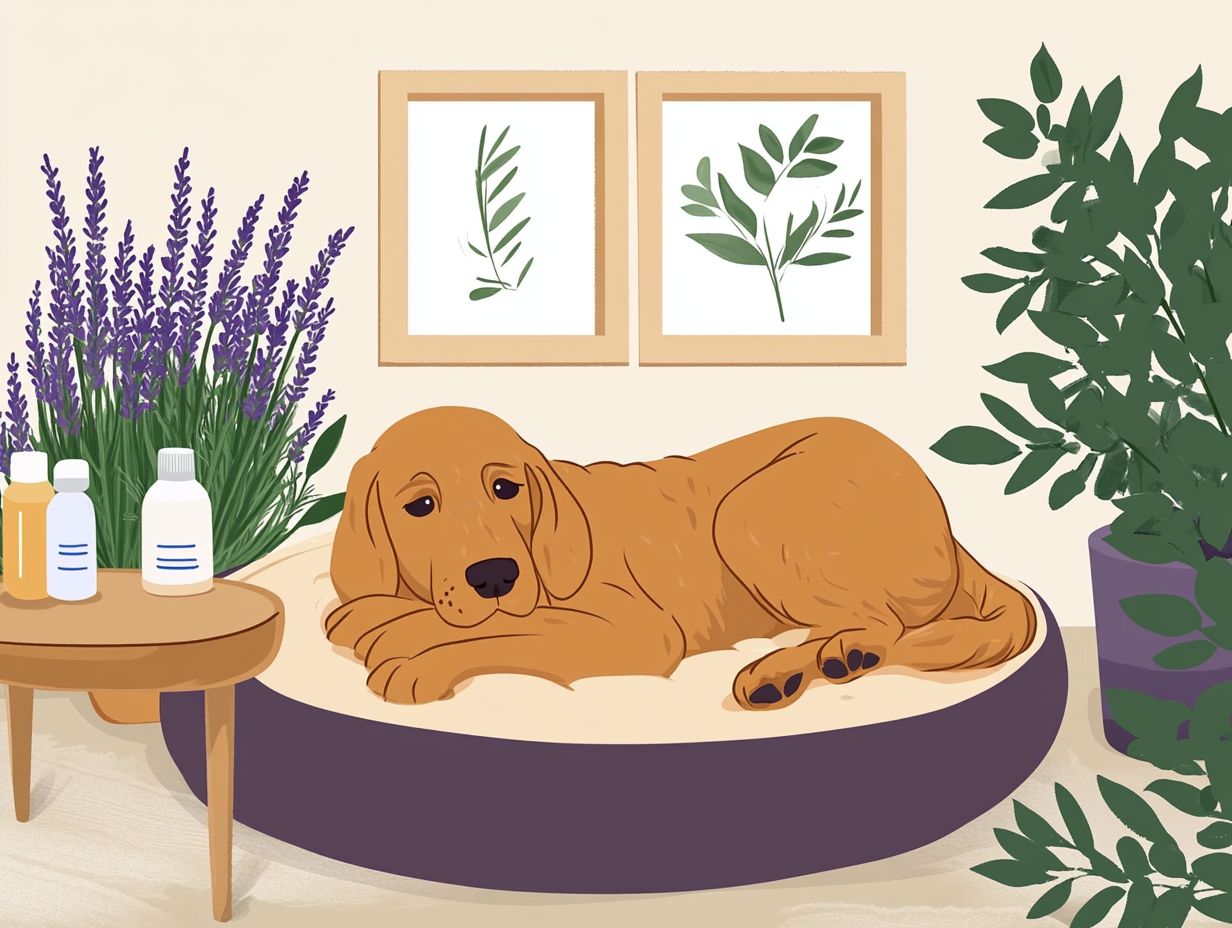
Choosing a specialized pet anxiety approach is important because not all techniques or methods work for every pet. By choosing the right anxiety treatment for pets, you ensure that your pet receives personalized and effective treatment for their specific anxiety issues.
What specialized treatments can help my pet’s anxiety?
Some examples of specialized pet anxiety approaches include behavior modification, desensitization and counterconditioning, medication therapy, and natural remedies. To ensure the best care, it is important to consult with a veterinarian or qualified pet anxiety professionals to determine the best approach for your pet.
How can I tell if my pet needs a specialized anxiety approach?
If your pet displays excessive fear, anxiety, or stress in certain situations or environments, it may indicate that they need a specialized anxiety approach. Other signs include destructive behavior, excessive barking or meowing, and changes in appetite or sleep patterns.
Can I use a specialized pet anxiety approach in combination with other treatments?
Yes, a specialized pet anxiety approach can be used in combination with other treatments such as training, environmental adjustments, and natural remedies. However, it is important to discuss this with a professional to ensure that the treatments do not interfere with each other.
How do I find a reputable specialist for my pet’s anxiety?
To find a reputable specialist for your pet’s anxiety, consult your veterinarian or research experts in animal behavior who have the proper training. Additionally, it’s helpful to know how to prepare for a pet anxiety consultation and ask other pet owners for recommendations.
Don t wait! Take the time to find someone experienced who truly understands how to help your pet feel better.


